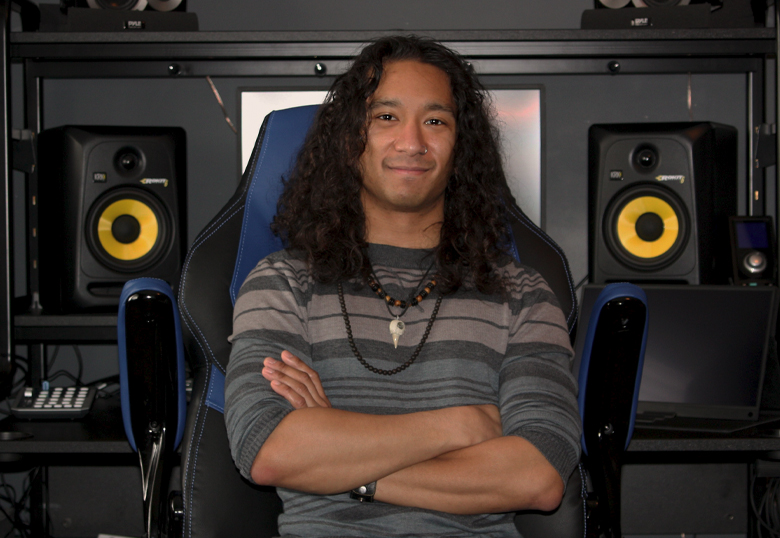Thanks to a boost in research funding, Digital Audio Arts (DAA) student Leonard Menon will combine his personal and scholarly passions, taking on two major research projects that will enhance his academic credentials and support the community through the development of an educational program for young music producers and artists.

This spring, Menon was selected for two academic awards, the 2020 Joyce and Ron Sakamoto Prize for Research and Development in DAA and the 2020 Chinook Summer Research Award, funding two separate, yet related, research initiatives.
“The goal of the (Sakamoto Prize) project is to spread the knowledge that I have obtained through conventions, research partnerships, the community and my personal life, and to amalgamate it into one cohesive program that is geared towards artist-producers,” explains Menon. The project is inspired by the research assistantship Menon is involved in, now funded by the Chinook Summer Research Award.
Menon will participate in a four month intensive research experience under the supervision of DAA faculty member Dr. Amandine Pras, supporting her SSHRC Insight Development Grant funded project, Practices and social aspects of the 21st recording studio. Throughout the summer, Menon will take part in hands-on research and receive one-on-one mentorship in writing academic papers to submit for presentation at the annual Audio Engineering Society (AES) conference in October. He will be participating in the online AES Europe convention in June and will have the opportunity to co-author an article to submit to Journal of the Association for Information Science and Technology by the end of the summer.
“I’ve been assisting Dr. Pras on her ongoing research that explores the varying mixing techniques among successful West African producers,” says Menon. “My tasks include continuing the extensive video indexing that is needed to draw stable conclusions, as well as to complete a literature review that will enhance my digital audio understanding.”
Menon has been assisting Pras since last fall, hired to index and edit video data collected in Bamako recording studios, then taking on more demanding tasks, including conducting multidisciplinary collective analyses, designing a comparative approach, and reading and writing for a peer-reviewed journal paper submission. He presented his initial findings during the Social Distinction in the 21st Recording Studio Symposium hosted at uLethbridge this spring, participating in the roundtable titled, Digital Ethnography of Recording Studios in Bamako (Mali).
“The research program requires strong inter-personal and communication skills to interact with other researchers at the University of Calgary, the Banff Centre and the School for Advanced Research in the Social Sciences (EHESS) in Paris, as well as rigor and persistence to complete intellectually challenging tasks,” says Pras. “I have consistently observed all these qualities in Leonard’s personality and work ethic.”
Pras’ research examines how upcoming generations use the recording studio from anthropological, music education and audio engineering perspectives. Studying how artists and producers with little to no formal training were developing new and exciting techniques has inspired Menon to take on a second research project, funded by his second award, the Sakamoto Prize for Research and Development in DAA.
“It has been fascinating to learn how these producers work with little to no formal training in the harsh political conditions of their country,” continues Menon. “I realized that they have used a variety of informal learning methods to learn how to arrange and mix in a digital audio workstation at a professional standard that is recognized by the rest of the world, a true milestone considering the scarce educational resources available to them.”
Menon's research is shedding light on how some individuals manage to produce and create with little or no professional training, using intuition and logic to manipulate the programs. He’s hoping to take what he learns and develop a curriculum to be taught to youth at Drop’n Beats, a local youth music program designed to build community through music creation and education.
Thanks to the support of Joyce and Ron Sakamoto, Menon has the next year to research and develop the program. The data gathered will be disseminated to the AES student chapter in a workshop in early 2021, and the results and footage of working with community members will be presented at the DAA Student Symposium in 2021.
The Joyce and Ron Sakamoto Prize for Research and Development in DAA is an annual research award presented to a student, or team of students, to acknowledge and foster research excellence in Digital Audio Arts at the University of Lethbridge. Recipients of the prize receive $5,000 for research-related expenses.
